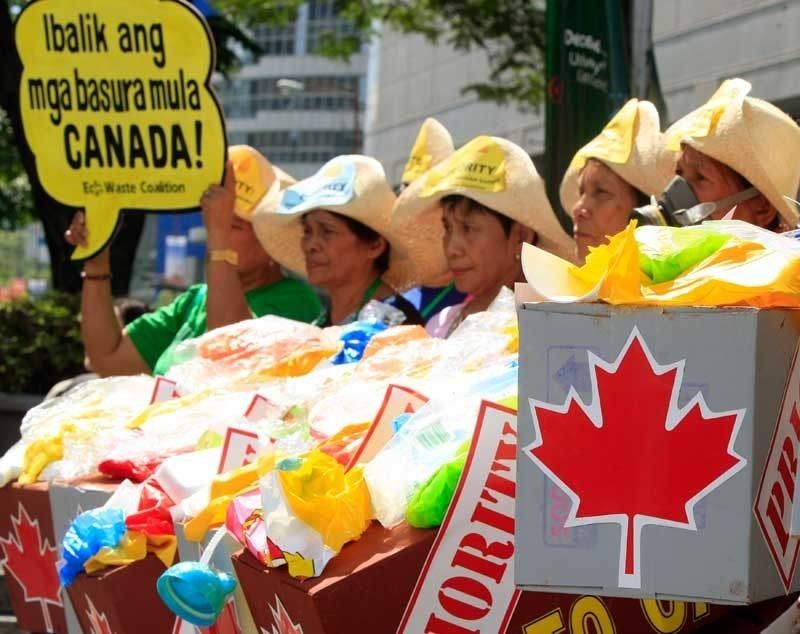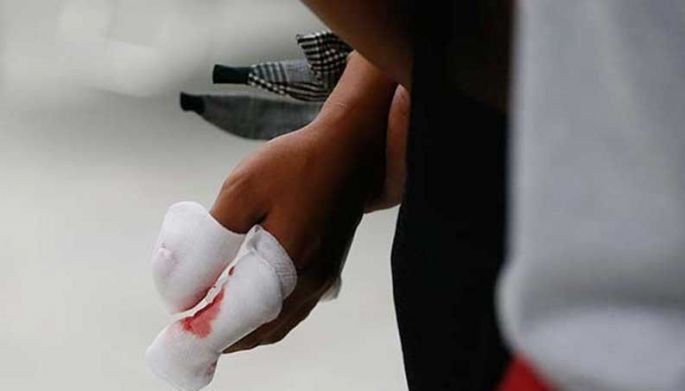Canada to shoulder cost of shipping back trash

MANILA, Philippines — The Canadian government is committed to shouldering all the costs to ship out 69 containers of waste languishing in the Philippines for the past six years, foreign affairs and environment officials reported during a Cabinet meeting on Monday.
The Philippines will also no longer accept garbage from any country, President Duterte said, two weeks after he demanded that the Canadian government take back the waste that arrived in the country in 2013.
Duterte made the remark during a Cabinet meeting at Malacañang, according to presidential spokesman Salvador Panelo.
“The President is firm that we are not garbage collectors, thus he ordered that the Philippines will no longer accept any waste from any country,” Panelo said in a statement issued yesterday.
A non-profit environment group welcomed the assurance made by the Canadian government to cover the expenses for the return of the garbage to where it came from.
“Being the state of export, Canada has the legal, moral and financial responsibility to take back the trash as well as ensure just reparation for the pollution caused by this illegal waste trafficking,” Aileen Lucero, national coordinator of EcoWaste Coalition, said.
Panelo questioned how the containers of garbage entered the Philippines.
“He directed the Bureau of Customs (BOC) not to accept anymore,” Panelo said, referring to Duterte.
Duterte has given Canada until May 15 to act on the garbage.
Late last month, Duterte directed the BOC to return to Canada the waste as he accused the Canadian government of turning the country into a dumpsite.
Duterte even threatened to declare war with Canada if the garbage is not shipped out sooner.
Panelo downplayed the President’s threat, saying it was a mere “figure of speech.”
More than 50 containers of garbage were reportedly imported by Valenzuela-based Chronic Plastics Inc. from Canada in 2013.
Canada has expressed willingness to take back the garbage and created a working group to address the matter.
Delay
While the Philippines is ready to return the garbage by May 15, Ottawa’s bureaucratic red tape may still delay the shipment of the trash back to its country of origin, the BOC said.
In a report to Finance Secretary Carlos Dominguez III, Customs Commissioner Rey Leonardo Guerrero said it might take weeks for the Canadian government to process the return of the garbage.
“Despite the Philippines’ readiness to re-export the waste, the Canadian government said it might take weeks for them to arrange the necessary documents from their end and that they might not meet the May 15 deadline,” Guerrero told Dominguez.
He said the Canadian government needed to secure the necessary import permits and to bid the fumigation services for the containers, which it has agreed to pay.
Guerrero said the Philippine government has secured all the requirements in preparation for the return of the garbage to Canada.
From April 30 to May 6, the Philippine Interagency Committee (IAC) and representatives from the Canadian government conducted a series of meetings to facilitate the re-exportation of the waste back to its country of origin.
Both parties agreed that the Philippines would shoulder the costs of inspection to determine the seaworthiness of the containers.
Canada will shoulder the costs of fumigation and transfer services.
Guerrero said the shipping lines tasked to transport the waste – Zim Line, CMA-CGM and Maersk – have conducted a seaworthiness check on the containers.
The shipping firms reported that all 69 containers are seaworthy. One of the containers needed to be secured with a flat rack container as it has been infested with termites.
Clarify
Meanwhile, EcoWaste Coalition has asked the BOC to clarify how eight of the 103 containers of Canadian garbage were disposed of.
EcoWaste said they were informed that the contents of 26 of these vans were dumped at the Metro Clark landfill in Capas, Tarlac.
Data obtained by EcoWaste Coalition from the BOC showed that Chronic Inc. exported 103 container vans in several batches to two Philippine-based companies, Chronic Plastic and Live Green Enterprise, from 2013 to 2014.
The BOC said of the 103 containers, 34 were disposed of locally, including the 26 dumped in Tarlac in 2015.
The group wanted to know the whereabouts of the eight containers.
“We want to know what happened to the Canadian waste loaded in the eight containers. Authorities need to tell the public when, where and how the waste was disposed of, and who paid for their disposal. We, the people, have the right to know,” Lucero said.
Of the 69 remaining containers, two are at the Manila International Container Terminal and 67 at the Subic Bay International Terminal Corp., according to the BOC.
The Basel Convention on the control of transboundary movements of hazardous wastes and their disposal, which lists Canada and the Philippines among the state parties, stipulates that parties should not oppose, hinder or prevent the return of the waste to the state of export. – With Mary Grace Padin, Rhodina Villanueva
- Latest
- Trending































